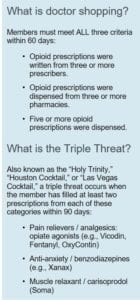Addressing the Opioid Epidemic: Knowledge is Power

 Opioid overdoses have tripled in Michigan since 2012. Michigan ranks 10th in the nation for rates of prescribing opioids and 18th for overdose deaths.
Opioid overdoses have tripled in Michigan since 2012. Michigan ranks 10th in the nation for rates of prescribing opioids and 18th for overdose deaths.
Michigan providers wrote 11 million prescriptions for opioids in 2016 — enough to give every Michigan resident about 84 opioid pills.
Fortunately, Blue Cross aims to reduce the sobering trends, one patient at a time.
Blue Cross began furnishing opioid usage reports to Physician Group Incentive Program (PGIP) organizations this past January. The reports pinpoint members who show evidence of two behavior patterns that contribute to opioid abuse: doctor shopping and/or filling prescriptions for Triple Threat drugs.
“We realized that providers may not recognize the dangerous behavior,” said Chris McQuain, a health care analyst for Blue Cross.
This could lead to providers writing prescriptions that are unnecessary or even dangerous, even when they have the best interest of the patient in mind.
For example, a patient could go to the emergency room with an acute injury and get an opioid, then follow up with a specialist, where they are prescribed more opioids, then follow up with their primary care physician, where they receive yet another opioid prescription. No one in the chain of events has acted inappropriately, but if any of the prescribers knew the patient already had opioids, they would likely not need to prescribe more.
“Since implementing the reports, we’ve seen a per-member per-month (PMPM) drop of 55 percent for doctor shopping and 80 percent for triple threat prescriptions,” said McQuain.
Blue Cross publicizes the reports through participating PGIP organizations. Providers can get details about their patients’ prescription usage via the Michigan Automated Prescription System (MAPS). Physicians welcome the new tool.
“Oakland Southfield Physicians is proud to partner with BCBSM in working with our physician community to impact the dangerous combination of medications (triple threat) of opioids filled from numerous physicians (doctor shopper) for the patients we serve,” said Executive Director Jennifer Hughes. Oakland Southfield significantly reduced the numbers of doctor shopping among their physician members over this nine-month period due to the availability of these Blue Cross reports.
This post originally appeared in the Blue Cross employee newsletter.


